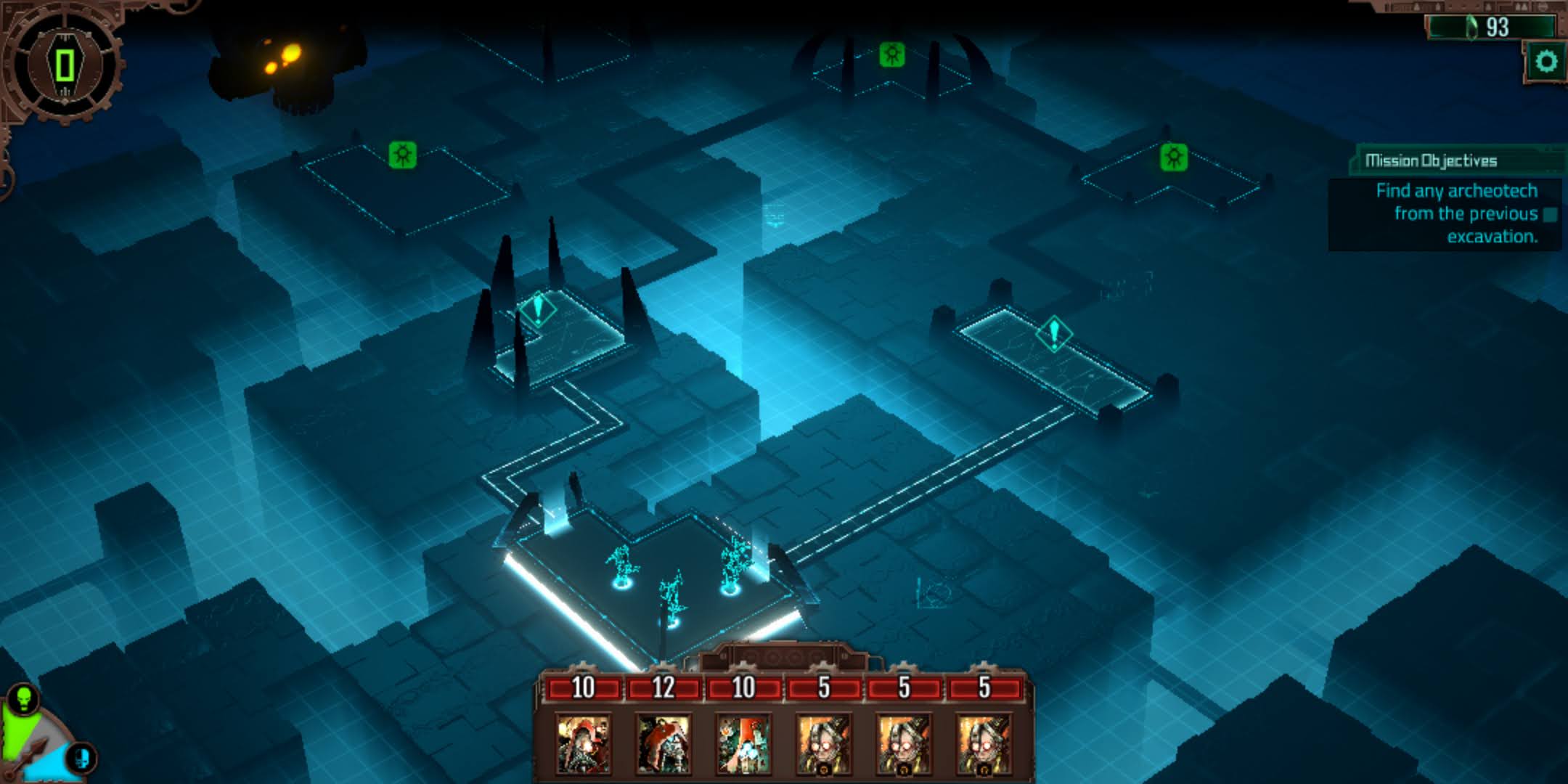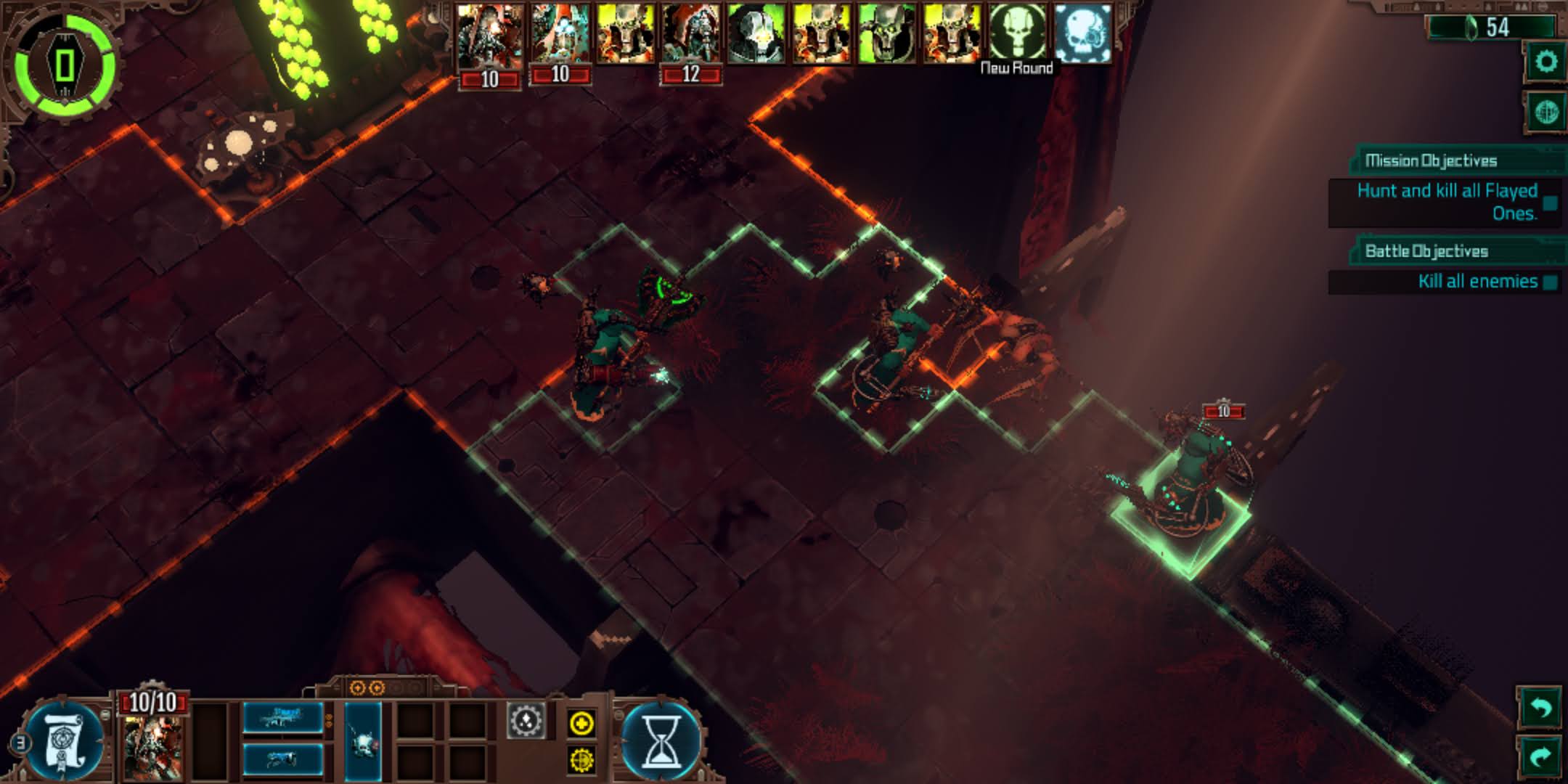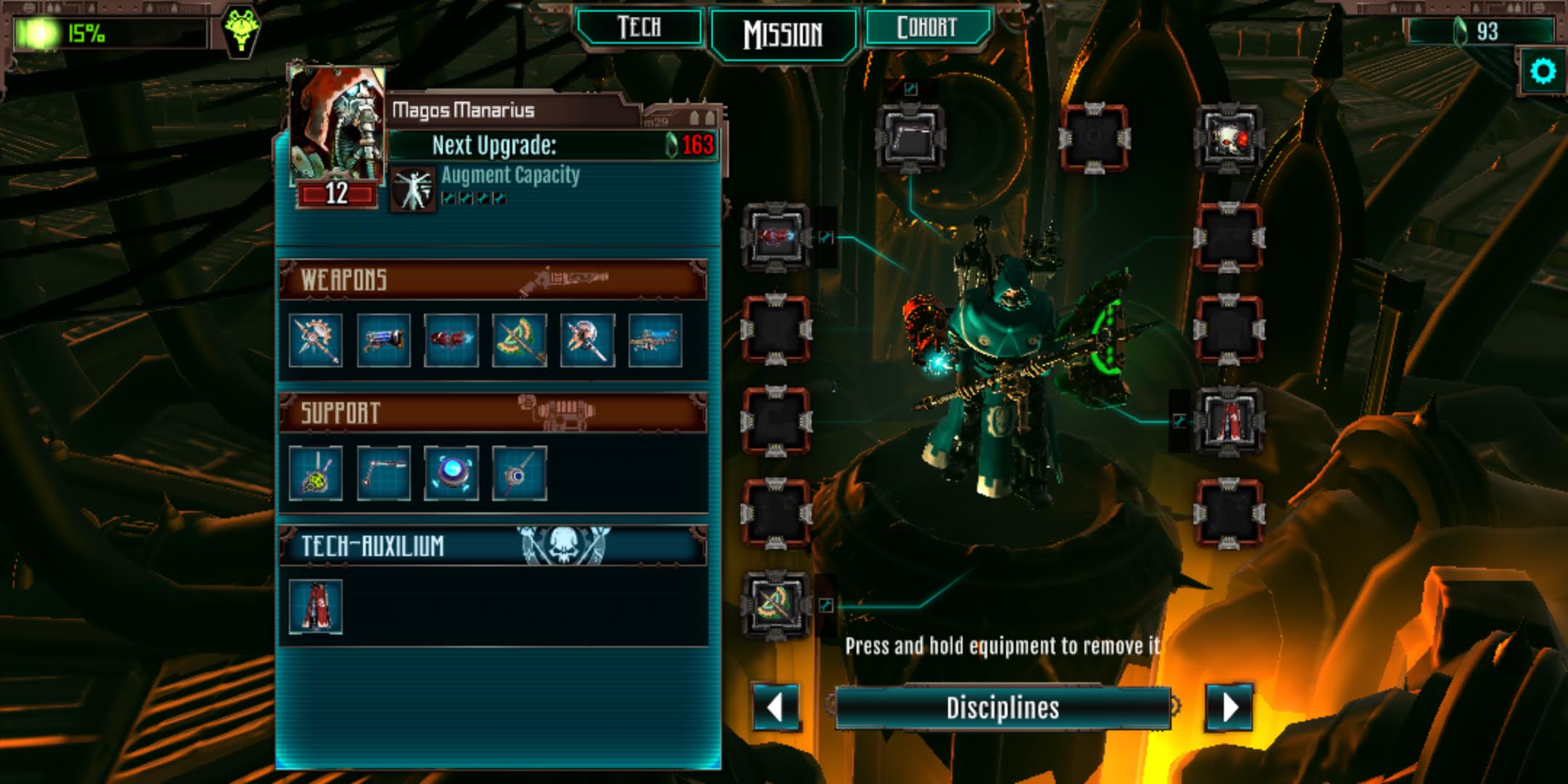Warhammer 40K: Mechanicus (Mobile) – Great game, but a not so great port
Yes, I’m reviewing another Warhammer game. Having now played the miniature’s, video games and a few spin-offs, I feel fairly qualified to talk about these games and the IP. When I had the chance to play the mobile port of Warhammer 40K: Mechanicus, I jumped at the chance. But after playing this version, I feel like I got a lesser quality experience than its PC and Console counterparts. This is a shame because the game is pretty stellar.
Much like other Warhammer games I’ve reviewed, Warhammer 40K: Mechanicus’ plot isn’t its strongest feature, serving more as a backdrop rather than a fully developed story. You are in the commanding seat of a group of Tech-Priests. A cult-like faction within the Imperium of Man, they are devoted entirely to knowledge and advanced machinery who after arriving on an alien world, learn of an awakening Necron force that you now must purge before the planet is lost. Aside from that, it’s the typical Warhammer schtick: Broody, grim and dark — all the usual factors you see in the Warhammer IP.
In Mechanicus’ case, dialogue, worldbuilding and some lore do a lot of the work and admittedly it does it pretty well. Dialogue is often laced with references and lore from the Warhammer universe, with discussions between the commanding tech-priests showing this best, mixing in the commanding tech-priests arguments, conflicts of interest and lore throughout the game. It adds a little flavour and context to the world that goes a long way in making the world interesting, but it’s still pretty bare unless you really enjoy the lore of Warhammer 40K; Although it’s certainly more interesting than some other games using this IP, so that’s a bonus.

On the flip side, the gameplay has more depth than I expected. Yes, it may seem pretty unoriginal on the surface, but a few key differences do help Mechanicus stand out in some areas. Combat is faster with no cover system and smaller map sizes, making battles quicker and more cutthroat, and also works well for the mobile platform. You can play a mission, put it down, and come back later nice and quickly. Additionally, you’ll have to manage cognition points which is a shared resource across your squad. You earn these by defeating enemies or using tech-priests to harvest them across the map, letting you use stronger weapons, extra movement, and certain abilities. These two alone aren’t don’t change the game dramatically, but they do give Mechanicus a different approach to combat that is certainly welcome. Instead of just hiding for cover, it encourages a more aggressive playstyle, having you finding cognition points, moving cannon fodder units to distract the enemy, and managing the shared resources across your team. As a result, it makes for a much quicker game and intense game that I’ve not experienced in the genre, which is quite hard to do when it comes to Warhammer games. Whilst it does make combat go by pretty quickly, it’s a nice change of pace instead of simply hiding in cover constantly.
Whilst this faster gameplay is a nice change, it’s not Mechanicus’ major strength. That comes from the amount of player choice the game offers — although some are more rewarding than others. After the tutorial mission, you have access to a hub area that lets you choose missions however you like, each offering their own difficulty and rewards with more becoming available as you play. The missions themselves are made up of an overview map of catacombs, with you moving between each section to reach the end goal. This whilst trying to avoid raising the awakening bar, essentially acting as a timer that makes missions harder the more it’s raised, in missions and the overall games. These can be a bit simplistic, some just having you killing some enemies or getting an objective, but hurdles with multiple-choice solutions are littered along the way that gives some more incentive to explore the relatively small maps. These let you approach situations however you’d like with the chance of both positive and negative outcomes like more resources or damaging units. To be frank, it’s not one of the games strongest aspects, but it still offers some freedom as to how you move through a mission which is more than some other games in this genre. It also plays nicely with the risk and reward of the missions, having missions become harder the longer you stay in them, but with more chances to get loot or extra rewards.

But where Mechanicus shines is in customisation. I’ve said multiple times how much I love good customisation, and Mechanicus has some of the best customisation I’ve seen in a turn-based strategy. With Tech-Priests’ love of technology, it’s only natural that it plays a part in gameplay. Loot unlocked through missions can be equipped over ten individual slots, each for specific gear like armour, energy weapons, melee weapons and so on. Additionally, there is a good number of varied abilities and upgrades you can unlock with Blackstone, a currency you earn during missions. These can be increased damage, more weapon range, healing, and a host of others. These can be mixed and matched with almost everything you have, letting you build some unique loadouts that can juggernaut melee fighters, diverse gunners, supports, or a mishmash of them all. The amount of potential in customisation is impressive, to say the least, I normally spend a lot of time trying builds and different combinations of weapons and equipment, and it’s no doubt what Mechanicus does best. The only issue is it didn’t feel like the best way to play it.
With all these great aspects Mechanicus has to offer, they are unfortunately hindered by the mobile platform itself. Controls are ok for the most part, with simple taps for most of the selections and movement during the battles. But the camera could be finicky at times, only letting you snap 45 degrees at a time rather than having full control. Though that is one of the smaller issues I had, what was more irritating was how choppy the game was. For the majority of my time playing, the game would be running at a less than smooth framerate that made simple actions like moving the camera or navigating menus an annoyance at times.

Lowering the graphics settings helps somewhat resolve this issue, but as a result, it becomes near impossible to read any text in the game. Often I struggled to see what my abilities were or read key bits of information because the text would be so blurry or small, and even at the highest settings, it didn’t fare much better on my Google pixel 3A XL. Along with this, you had UI that was too small and hard to see, tricky and sometimes unresponsive controls, muddy and rough-looking graphics and other minor annoyances that piled up into quite a frustrating experience; And frankly, a lot of these were due to the fact it was in mobile.
Warhammer 40K: Mechanicus is a great game marred by this not so stellar port. With gameplay that offers quick and tactical battles, huge customisation options, and an interesting setting, it’s a shame that it hasn’t translated as well as I’d have hoped to mobile platforms. If possible, I’d recommend paying a bit extra for the PC or console version or playing on a powerful tablet, because even with the issues I had, I enjoyed the game and think it’s one fan’s should look into; Just on a platform that does the game and its developers justice.
This game was reviewed on a Google Pixel 3A XL.
Warhammer 40K: Mechanicus is available now on Android, iOS, Steam, Switch, Xbox One, and PS4. Check out the developer’s Website and Twitter for more information.


Comments are closed.